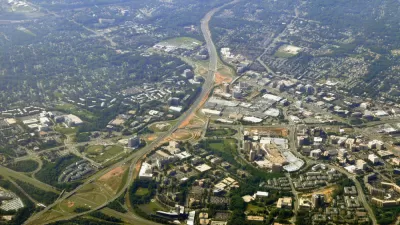Articles that claim online commerce have surpassed sales at brick and mortar stores are wrong, according to an article on City Observatory.

Online sales, or e-commerce, has grown rapidly in the past few years, but widely published assertions that they represent half of all retail sales are simply not true, according to a story by Joe Cortright. Cortright cites stories in Next City and Fortune that claim internet sales have surpassed those from brick and mortar stores, Cortright cites data from the Census Bureau that directly contradicts those stories, "E-commerce retail sales in the second quarter of 2016 were $97 billion, equal to about 8.1 percent of total retail sales in the U.S." This is not a difference that could be explained away as the natural variance between two studies. It's a difference in kind.
In tracking down the source of these statistics, Cortright came across an online study of frequent, avid online shoppers that specifically sought out heavy users of online shopping to investigate their perspectives.
The fallout of this growing misunderstanding of physical retail can have large implications for planners. Retailers are the crossroads of our cities and towns. They make our cities worth walking through. If they're being replaced, we need to know. Trends in retail become trends for cities, but exaggerating that process is counterproductive.
FULL STORY: Lies, damn lies, and (on-line shopping) statistics.

Alabama: Trump Terminates Settlements for Black Communities Harmed By Raw Sewage
Trump deemed the landmark civil rights agreement “illegal DEI and environmental justice policy.”

Planetizen Federal Action Tracker
A weekly monitor of how Trump’s orders and actions are impacting planners and planning in America.

The 120 Year Old Tiny Home Villages That Sheltered San Francisco’s Earthquake Refugees
More than a century ago, San Francisco mobilized to house thousands of residents displaced by the 1906 earthquake. Could their strategy offer a model for the present?

In Both Crashes and Crime, Public Transportation is Far Safer than Driving
Contrary to popular assumptions, public transportation has far lower crash and crime rates than automobile travel. For safer communities, improve and encourage transit travel.

Report: Zoning Reforms Should Complement Nashville’s Ambitious Transit Plan
Without reform, restrictive zoning codes will limit the impact of the city’s planned transit expansion and could exclude some of the residents who depend on transit the most.

Judge Orders Release of Frozen IRA, IIJA Funding
The decision is a victory for environmental groups who charged that freezing funds for critical infrastructure and disaster response programs caused “real and irreparable harm” to communities.
Urban Design for Planners 1: Software Tools
This six-course series explores essential urban design concepts using open source software and equips planners with the tools they need to participate fully in the urban design process.
Planning for Universal Design
Learn the tools for implementing Universal Design in planning regulations.
Clanton & Associates, Inc.
Jessamine County Fiscal Court
Institute for Housing and Urban Development Studies (IHS)
City of Grandview
Harvard GSD Executive Education
Toledo-Lucas County Plan Commissions
Salt Lake City
NYU Wagner Graduate School of Public Service





























